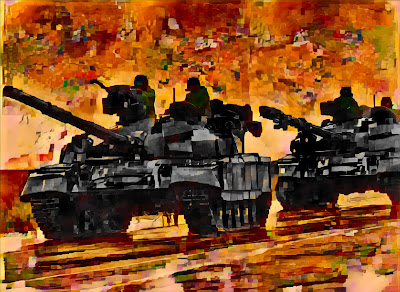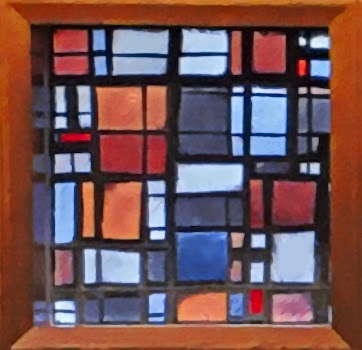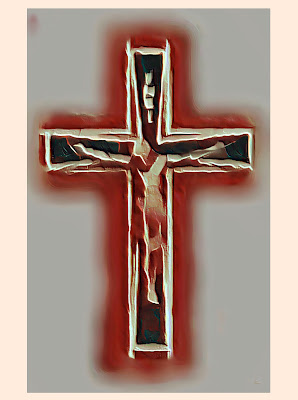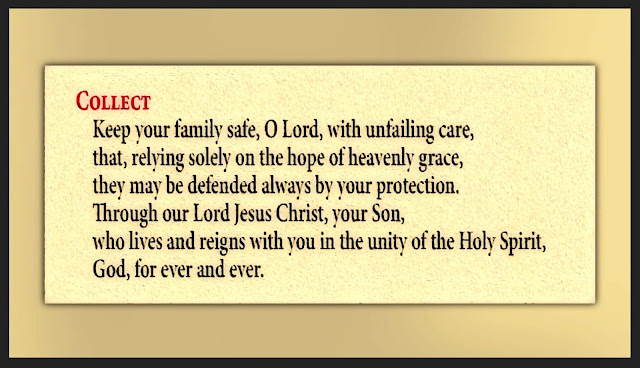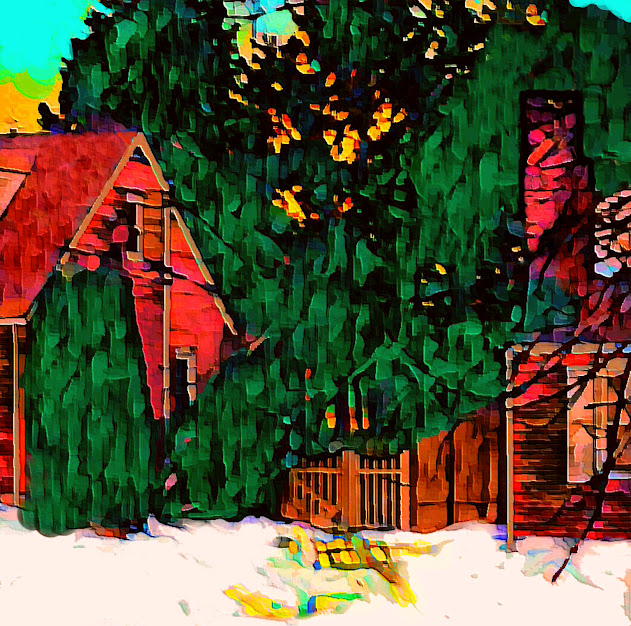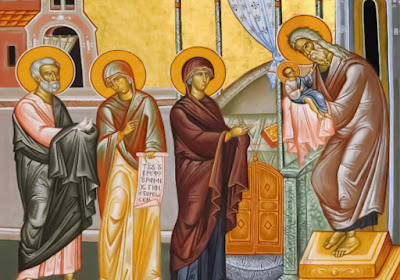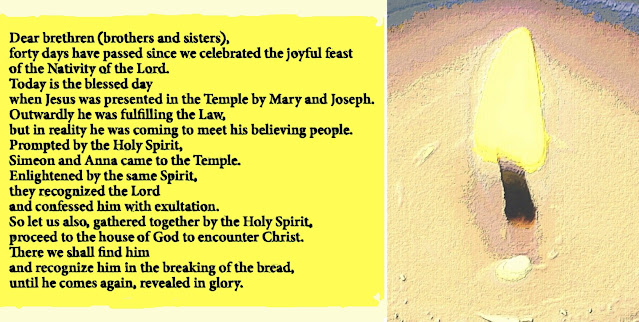An ordinary man engages the circumstances of daily life, seeking to draw closer to the Mystery who gives meaning to everything.
Sunday, February 27, 2022
Our Hope is the Lord, Who Loves and Forgives Us
Thursday, February 24, 2022
Vladimir Putin’s War in Ukraine
In the early morning hours of February 24, 2022, Russia launched a massive invasion of Ukraine by land, sea, and air.
This is not really surprising; it has been brewing at least since Vladimir Putin annexed Crimea in 2014 and stirred up separatist movements in two of Ukraine's Eastern provinces. Eight years ago, Western media featured daily updates on Ukraine's vast protest movement against the heavy hand of Putin's hegemony in the region and his obsession with preventing Ukraine from deepening its ties with the rest of Europe. I posted about these events several times on this blog in February and March 2014.
In those days, there were widespread concerns in everyone’s minds about how far Putin's militarism would go. Much of the West soon became distracted from these concerns, but the Ukrainians continued to endure the intrusion of Russian power even as they struggled to solidify the realization of stable institutions and alliances as an independent nation-state.
Now, however, the crisis has become exponentially more acute. Russian armed forces are engaging in a brazenly open invasion of the whole of Ukraine, seizing sovereign territory, inflicting casualties, destroying infrastructure, and approaching the capital city of Kyiv.
All of this, according to Putin, is justified by the alleged security needs of the two separatist “republics” at the border of Eastern Ukraine, to which he granted “recognition” on Monday. Putin claims to be responding to Ukrainian attacks against them, without offering any evidence. It’s the classic pretext for naked aggression.
In fact, Putin has a list of grievances and accusations against the West, and insists that Ukraine itself has no right to exist as a sovereign nation. I read the entire text of the hour-long historical-cherry-picking speech he gave on Monday. It was crass, skewed, and incredibly condescending toward Ukrainian aspirations. Even worse, it was a virtual apologia for centralized dictatorship and a preposterous attempt to whitewash the filth of the Soviet past, at least with regard to Soviet centralism’s provision of strength and political stability.
Putin is not a Communist. But he seems to be an admirer of autocracy, in particular Russian autocracy. Listening to Putin's speech of February 21, one would think that Moscow’s overlordship was the only effective and viable political option for governing Eastern Slavic peoples. He blames Lenin and the early Bolsheviks for encouraging too much the nationalist movement in Ukraine in the early 20th century in order to secure Ukrainian support for the new regime of “Soviet Socialist Republics.” Then, after making vague references to the regrettable nature of Stalin’s terror tactics, he seems to imply that the end result of Stalinism was somehow beneficial in that it restored “unity” to the Soviet state (i.e. centralized totalitarian control to Moscow).
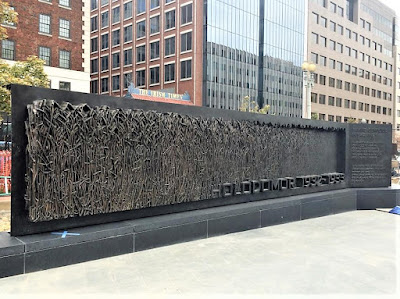 |
For someone who claims to be appealing to the greater patriotic sense of Ukrainians, this was an outrageous lapse into historical forgetfulness. Joseph Stalin is not a name that inspires reverence or nostalgia among Ukrainians. How can any respectable world leader (much less the leader of Russia!) speak of Stalin with reference to Ukraine without mourning the appalling genocidal famine - the Holodomor - perpetrated by Stalin in 1929-33 that murdered millions of Ukrainians? Is it any surprise that Ukrainians don’t want to entrust themselves to the hegemony of a Moscow ruled by the likes of Vladimir Putin?
I don’t know what Putin was thinking; it would be easy here to just accuse him of being a rogue bent on humiliating and insulting the nation he was about to invade and conquer. The implications of such an accusation are so terrible, however, that I would prefer to assume that it only indicates the crass ignorance of a career KGB agent who - whatever his pretenses to historical erudition may be - thinks no further than his immediate objective requires. In any case, Putin decided that the only mistake of Stalin worth mentioning in his speech is that Stalin didn’t change the Soviet constitution to reflect that the “republics” were in reality nothing more than provinces of Moscow’s Great State. This left open the door for the re-emergence of “nationalist movements” in the 1980s and the eventual fragmentation of the Russian-controlled “Union.” According to Putin, this is the only reason why Ukraine exists as an independent nation. This, to say the least, is another insult against the Ukrainian people and their spirited and consistent efforts to affirm their unambiguously verifiable national identity and its deep roots in their history as a people.
Ukrainian perseverance seems to be a source of great frustration for Putin, who wants to exercise a stronger hand in this fertile and resource-rich country. He claims that he does not seek to restore the old centralized Soviet political union (or parts of it). What seems clear, however, is that he believes in some kind of “Greater Russia” that looks to Moscow as its political reference point (in the strong sense of the term).
By launching a massive military action, without provocation (or at least grossly disproportionate even for one who agrees with Putin’s goals and assessments), Putin only proves that the Ukrainians have been right to fear him, and to seek other security alliances (e.g. NATO) to protect them against his aggression. Whatever one thinks of NATO's relevance or practicality in the multilateral world of today, it was originally established to be a defensive alliance and it has remained true to this purpose. Is it surprising that nations surrounding Putin’s Russia have sought refuge in NATO - Poland, Latvia, Lithuania, Estonia? Stalin’s centralized State apparently decided that the latter three “belonged” under its power and made an effort to include Poland as well. Today these nations fear that Stalin’s post-communist, autocratic protégé may have similar plans for the “influence” of a new Greater Russia. In light of what’s happening in Ukraine right now, it is understandable if they feel that their fears are justified.
It might be argued that Ukraine is a “special case.” But while there are certainly profound and ancient fraternal bonds between Russians and Ukrainians, their long and complex history does not vindicate the always-inflated claims (old or new) of Muscovite imperialism. I have long studied the history of this part of the world and I have great love for both the Russian people and the Ukrainian people, as well as those who have mixed Russian and Ukrainian ancestry. I understand and appreciate their concerns about many destructive secularist Western cultural and social forces. But dictatorship and offensive war are also destructive forces. Domination is not brotherhood, and there is nothing new about Vladimir Putin’s dream of reviving some new form of the regional domination once enjoyed by the Soviet Union or the Russian Empire.
Certainly Putin’s theories and dreams do not constitute a justification for an invasion of Ukraine using damaging and lethal force, a violation of international law so flagrant that no other nation is willing to endorse it. The times we live in may be tumultuous and confusing, but the fundamental tenets of international law are still recognized. They still exist to restrain the gangs that roam the global village, and to protect the multitudes of innocent people therein.
What does Putin hope to accomplish? It’s hard to fathom the recklessness of actually launching an invasion of this magnitude. What he has done is in total opposition to building bonds and furthering closeness between Ukraine and Russia. It can only bring suffering to Ukrainians and Russians now and in the future, and the consequences of any further escalation would be catastrophic in ways we can scarcely imagine.
May God have mercy on the perpetrators and the victims of this war, and on the whole world. Holy Theotokos, Mother of God, Virgin of Kyiv, Virgin of Vladimir, Mother of Tenderness, protect all your children. Beg your Son to convert our hearts to Him.
Tuesday, February 22, 2022
Luigi Giussani: “Teacher of Humanity”
On this day, the Feast of the Chair of Saint Peter, we also mark the 17th anniversary of the death of the great Monsignor Luigi Giussani, founder of the Communion and Liberation movement.
This picture shows how I remember him thirty years ago, with his big earthy face and gravelly voice, his pile of books and his emphatic gestures, his wisdom and his passion: a "teacher of humanity," John Paul II called him. He certainly taught mine.
My whole life is different because of this man, because of his witness that Jesus really is at the center of our human life, with all our hopes, joys, and suffering. And because of the charism of CL, which still helps me remember this every day.
Sunday, February 20, 2022
“Bless Those Who Curse You…”
Jesus said to his disciples: “To you who hear I say, love your enemies, do good to those who hate you, bless those who curse you, pray for those who mistreat you. To the person who strikes you on one cheek, offer the other one as well, and from the person who takes your cloak, do not withhold even your tunic. Give to everyone who asks of you, and from the one who takes what is yours do not demand it back. Do to others as you would have them do to you.
“Stop judging and you will not be judged. Stop condemning and you will not be condemned. Forgive and you will be forgiven. Give, and gifts will be given to you; a good measure, packed together, shaken down, and overflowing, will be poured into your lap. For the measure with which you measure will in return be measured out to you.”
Saturday, February 19, 2022
God’s Mercy Brings Forgiveness, Healing, and Freedom
It begins with humility. We remember that we are dust. We are sinners. Indeed, we fail in so many ways.
Yet we also know that our freedom still lives within this debilitated frame. We know that our freedom has been summoned by the promise of love, by the beauty and attraction of a fulfillment that is mysteriously made possible, by a hope that we cannot extinguish.
And we know that sometimes, to some extent, we have freely chosen to hide in the shadows of ourselves. We have refused to take the next step on the path that the light indicates to us. We have chosen to draw back into darkness.
Something of the brokenness that each of us suffers right now is our own fault. In the immensely complicated fabric of every human life there are many events and circumstances, but there is also the willful misuse of freedom. There is sin.
We have all sinned. We all need forgiveness.
We are able to recognize so many genuine excuses for our failures, and these are factors of our lives that need attention, compassion, and healing. All of this is important, but it is not enough. We need to acknowledge and perhaps feel the touch of the unbearable weight of our own responsibility, our yielding to weakness, indulgence, distraction and our taking up of the weapons of destruction of ourselves and others. We need to acknowledge that we really are sinners.
Each one of us needs to examine his or her conscience and seek forgiveness for our sins.
When we bring this ultimate vulnerability into the open and raise it up to the One who has created us and who sustains our being, then we can discover the wonder of mercy.
God's response to our sins is Jesus. God gives Himself, and the abyss of His love is infinitely "deeper" than any of our wounds. He wants to turn our hearts away from sin, to forgive us, to heal our brokenness and empower us to cooperate with - and to be elevated and transfigured by - His redeeming love.
Wednesday, February 16, 2022
The Sweetest "Valentine" Ever!❤
Maria came over on Saint Valentine's Day and she was wearing this "Nana & Papa" shirt. She also was in a smiley mood.
It made our day!😚💝🙃😊
Tuesday, February 15, 2022
What is the "Joy" of the Christian Life?
Joy is one of the promised fruits of Christian life. But it is a very particular kind of joy, a joy that comes from a living relationship with God through Jesus Christ. It eminently corresponds to the deepest yearnings of the human heart, but also shares in the life of God, and therefore goes beyond finite human ways of understanding and measuring things.
Christian joy is deep and foundational. It is an underlying reality of the new humanity that we receive from Christ, through the gift of the Holy Spirit. The heart of Christian joy is a participation, already begun here and now in the life of grace, in the very mystery of God's own infinite joy, of His life, of His glory. No experience in this life can simply be objectified, analysed, and classified as "joy-in-the-radical-sense," because it is God sharing His joy with us — the joy that is God Himself.
God elevates and purifies our affections, draws us through them, and gives us much help that strengthens us by illuminating and affecting our reason, and our psychological and emotional experiences. But even when we cannot "feel Him" in any way, we still believe in Him by faith and cling to Him in hope. We know that the source of our joy is with us, and that if we love Him, then we possess that invincible joy even if the world rages at us, even if sorrow seems to overwhelm us in the face of earthly loss, even if we are lonely, sick, imprisoned, or oppressed, even if incomprehensible pain fills our entire conscious awareness.
It is for our encouragement (not our discouragement) that the grace of the Spirit touched in special ways some of the martyrs and saints, so that they embraced suffering and even gruesome death "as if going to a wedding feast." But I think that God's Kingdom is overwhelmingly made up of saints who probably went through their deaths with considerably less enthusiasm. Many lived their lives with temperaments that would not be classified as "joyful" in the mundane sense.
The joy of God is lived within the love of God, and it realizes itself vitally within our personality in the measure in which we love God and our neighbor. The resonance within experience and the external signs of joy have different forms, different levels of intensity, and variations that correspond to the secret ways in which the grace of God is at work transforming mysteriously the particular person according to his or her own history, wounds, and suffering.
If we are patient and loving with people, we will be surprised by their joy as it peeks through like the sun on a cloudy day. And a glimpse of it will enrich us.
There are certain dispositions, a certain "personality type," and certain ways of living that we commonly identify as pertaining to a "joyful person" (and that we rightfully expect to find abundantly in a healthy Christian community). It is not surprising that joyful people have a zest for life, a ready smile, and a disposition for friendship and hospitality. It is not surprising that they are prepared to serve others, and to work for peace, justice, and reconciliation amidst the conflicts of life in this world. Joy by its nature manifests itself externally, but Christian joy is a light that shines in darkness, a transfiguring light that grows in the midst of the many limitations of our frail and wounded human nature. It is the beginning of our mortal humanity's being clothed with immortality. This joy that is the gift of the Spirit is a vitality always deeper and beyond any externally perceptible "ebullience" in human actions or emotional states. Rather, the working and fruition of Christian joy opens new perspectives, gradually transforms our awareness of the meaning of reality, and prompts us toward the real, concrete possibilities of self-giving love within whatever circumstances we are called to live each day.
Many will point out that life even in this world becomes more happy and fulfilling in general for those who love God. This is true, I think, because the foretaste and even the initiation of eternal life begins here and now, and gives a new depth of meaning to everything in our lives. But the unfolding and increase of joy are not formulaic and predictable. Everyone shares a common, redeemed human nature, but each one has a unique vocation that includes unique challenges, circumstances, sufferings, and constraints. Christ's presence brings healing to the whole person... but in different ways and in different qualities, always mysteriously and personally, not always obvious and evident to our limited measure for "the way things should be..."
Joy is certainly greater and deeper than what we consider to be "good feelings" about ourselves, others, life, or the ways of God. After the resurrection, Jesus didn't ask Peter: "Simon son of John, do you feel good about me...." He asked, "Simon son of John, do you love me...."
It is in our belonging to the Risen Christ that we have joy, and nothing can separate us from this radical joy: neither principalities and powers, nor the present or the future, nor the kings of the earth and their designs, nor persecutions, tribulations, pains, nor the tragedies of life, the loss of loved ones, the oppression of harsh task-masters, nor sufferings, nor piercing screams from some horrendous illness or injury (whether it is us who scream, or the person we love most in the world whom we must accompany even when there is nothing we can do to stop the pain), nor the harrowing abysses of psychiatric disorders, the feelings of darkness and "deadness" of neuropsychiatric depression, the mental diseases that cause irresolvable anxiety and obsessions that rage like fire in our brains, nor the implacable daily unseen torture of a chronic illness that no one else seems to understand, nor any of the countless ups or downs of life — extraordinary or ordinary — that we can imagine.
When we hear that the mark of Christianity is joy, we shouldn't say, "Oh, I don't feel joyful, so I guess I'm not a real Christian." Rather let us say, "No matter how I feel, my joy is in Christ and in belonging to Him."
Certainly when we say this, let us examine ourselves, and see to what extent we are truly open to ways that the Spirit wants to fill our hearts with the joy that corresponds to our own vocations and circumstances. Let us ask the Lord to increase our joy, nourishing it through prayer and encountering Jesus in the sacraments, in our neighbors, especially in the poor who need our attention, solidarity, and merciful love. Let us seek forgiveness for all our sins (which never bring true joy in themselves, although our sorrow over them is already the beginning of joy). And let us live in hope, because the life of God is our joy, and His love is stronger than our sins, our suffering, our wounds, our frailty.
We have confident joy because He has reached down to our deepest need. God has joined Himself to us in the most desolate places of our pain and tribulation. Jesus is with us, and our wounds belong to Him; they are His wounds, forever. Joy is the revolution born from these transfigured open wounds, open forever in His resurrected body, because of His love which He gives to us.
The joy of this love becomes mysteriously radiant even within all the moments of this present life — this often arduous journey — because love bears all things, believes all things, hopes all things, endures all things (1 Corinthians 13:7). In His love we keep going, we hope, we desire, we offer, we trust, we cry out for God, we never give up.
Saturday, February 12, 2022
Wednesday, February 9, 2022
Maria’s Got a Good Grip
Maria is getting quite curious and purposeful; she also likes to GRAB things that interest her, like Papa’s beard!🤭☺️ (Most recent VIDEO below.)
Tuesday, February 8, 2022
The Hope of Heavenly Grace
Here is the beautiful Collect Prayer from the liturgy for this week.
We place our hope in the Lord's immense love, His "protection" and "unfailing care." He has poured out for us His "heavenly grace" through His Son Jesus Christ, who died and rose for us, who reveals the depths of God's love. Jesus sends the Holy Spirit to form us into children of the Father - His brothers and sisters - and He remains in our midst, He dwells with us in His Church.
He travels the roads of the world and all of human history, and He calls every human person to Himself through our prayer and witness as members of His Body, and through the mysterious workings of the Holy Spirit in their hearts.
We rely "solely on the hope of heavenly grace," which is given to us and to the whole world through Jesus Christ the sole redeemer of humankind, the center of the cosmos and of history, the meaning and destiny of the life of every person.
Monday, February 7, 2022
“Faces” and “Winter Scenes” from JJDigitalArtStudios
I have been working a lot with images lately. The vast majority of my pictures never get posted, including some that I think are pretty good. The reasons why I share some things here or on other platforms are not clear to me. I know that I would rather not post something unless I feel that I’m “done” with it, and that it might have value for others. There are many other “works-in-progress” and even more “clutter” (fortunately, it’s virtual clutter).
Tools for visual creativity on the Internet are in an “expansion mode” right now. I don’t even have the “fancy stuff.” But I have improved my “digital palette” quite a bit over the past year, and I have extended my study to portraiture (mostly with myself as a “model,” along with a few athletes and celebrities whose images are everywhere). I have no interest in outlandish facial distortions, combining human and animal faces, and all that weird stuff. But the overall capacity to render a photographic portrait in cartoon form, and to vary light, shadow, colors, textures, etc. are things that I have been doing, even as the different possibilities for “presenting the human face” seem to be increasing by the week as the AI technicians try to outdo one another.
The geography of the human face is inexhaustible and full of wonders. Some of the techniques aim to remove all flaws and transform “AI faces” into bland avatars. Much is lost in this obsession with homogeneity. Portraits have their origins in the impressions of real faces that belong to real persons, however much change or originality the artist might introduce. For me, the dignity of the human person remains foundational, whether presenting an image that represents someone real (in which case I hope not only to respect, but to honor such persons) or constructing a “fictional face” which remains a type of our humanity and the persons who share it as our brothers and sisters.
I don’t know how much the present “AI technique boom” will really be useful. Most of the trending themes are fads. I am trying to discern what has value for my own artistic purposes (and trying to keep those purposes focused). My work leads to many dead ends, with some occasional progress, and virtual clouds full of failed experiments. But no sheets of paper are used. No trees have to die for my art.
Speaking of “dead trees” (and some live ones too) here are some “Winter Scenes” from 2022 thus far:
Saturday, February 5, 2022
Saint Agatha: “Possess All That I Am — You Alone!”
Friday, February 4, 2022
Fatherhood: Love Always Creates Freedom
Parenthood involves many sacrifices (as well as joys, of course). It is an ongoing journey of self-giving, attentiveness to others, and different kinds of suffering that are hard to grasp concretely until one experiences them. One can only be a good parent insofar as one is willing to die to one's self with trust that the value of one's efforts is beyond one's measure. Patience, purity of heart, and "poverty of spirit" are necessary in parenthood, as they are in all authentic ways of loving persons.
Nevertheless, I have long struggled with the temptation to regard my fatherhood within the context of our Western culture’s dominant mentality of “success,” external achievement, self-assertion, and wealth-as-possession-of-things. After all, I haven’t had much worldly success to brag about. But at least I’m the father of five (four young adults and one teenager still at home). Now I'm a grandfather too, right? Congratulations to me! And they are all "good kids." In fact, we often hear that they are remarkable and exceptional young people.
I recognize that it's appropriate to find satisfaction in my family, and to be immensely grateful and joyful for them - not so much because they represent a "job well done" overall (thus far), but above all because I love them.
Love is a gift and a mystery that calls forth much human effort - much work, responsiveness, attention, cultivation, openness, and vulnerability - but it’s never reduced to something we “produce” and “control.” Love is personal and interpersonal. Human love is always a gift, a source of wonder, a vocation, a sign of the transcendent Mystery for whom we are all made.
Most of my kids have grown up during the course of this blog, and I have begun to grow "old." The relationships are still real, personal, and woven-together, flawed, and "complicated" in ways that only family relationships can be. Still, their modality has changed (and continues to change). It used to be noisy around this house. Now it has become much quieter ... except when Maria is here!😉 Perhaps, in the future, it will be noisy again (at least sometimes) with the rumble-tumble of numerous grandchildren - siblings and cousins - running all over the place.
In any case, life will continue to change. Things can only grow by changing, and human persons can only grow in love by changing freely, by using their freedom to deepen their own relationship to goodness, by opening up to embrace their destiny.
Pope Francis commented vividly on these points - in the context of the meaning of fatherhood - in some recent reflections about Saint Joseph. He sheds light here on the inherent dynamic of genuine fatherly love in particular, in a way that is true for all love, and that points also to the centrality of freedom for the fulfillment of every person. Here are some of Francis’s words that I found especially significant and helpful:
"One of the most beautiful aspects of love, and not only of fatherhood, is indeed freedom. Love always creates freedom. Love should never become a prison, a possession. Joseph shows us his ability to take care of Jesus without ever possessing him, without ever wanting to manipulate him, without ever wanting to distract him from his mission.
“I think that this is very important as a test of our capacity to love and also our capacity to know how to take a step backwards. A father is good when he knows how to remove himself at the right time so that his child can emerge with his beauty, with his uniqueness, with his choices, with his vocation. In this sense, in every good relationship, we have to give up wishing to impose from on high, an image, an expectation, indeed a visibility, completely filling the scene with excessive protagonism.
“The wholly ‘Joseph-like’ characteristic of knowing how to step aside, the humility that is the capacity also to slip into second place, is perhaps the most decisive aspect of the love that Joseph has for Jesus. In this sense Joseph is a very important character, I dare say an essential one, in Jesus’ biography precisely because at a certain point he knows how to step away from the scene so that Jesus can shine in all his vocation, in all his mission.
“Faced with the image of Joseph, we have to ask ourselves if we are capable of knowing how to take a step back, to allow the other, and especially those entrusted to us, to find in us a reference point, but never an obstacle."
Wednesday, February 2, 2022
The “40th Day of Christmas” - an Epiphany in the Temple
Today we have celebrated the solemn Feast of the Presentation of Jesus in the Temple.
It has now been 40 days since Christmas, when we recalled with joy the birth of Jesus, the Word made flesh who has come to dwell with us, to reveal the glory of God and the immeasurable depths of His love for us.
Today Jesus is brought to the Temple in Jerusalem by Mary and Joseph in accordance with the Mosaic Law. Here He is revealed to the faithful of the Old Covenant who have ardently awaited His coming. By the grace of the Holy Spirit, there are a few who recognize the baby Jesus as the Messiah in this joyful "epiphany," as Simeon testifies: "My eyes have seen the salvation which You have prepared in the sight of all nations. A light of revelation to the Gentiles and the glory of Your people Israel" (Luke 2:30-32).
Then "Simeon blessed them and said to Mary his mother, 'Behold, this child is destined for the fall and rise of many in Israel, and to be a sign that will be contradicted—and you yourself a sword will pierce—so that the thoughts of many hearts may be revealed.'" (Luke 2:34-35).
Since Jesus is the "light of revelation," today is also a special day for the blessing of candles, "Candlemas." One month from today, we begin the liturgical season of Lent, in penance and preparation for the observance of that Holy Friday when Jesus takes our sins upon Himself... and the Resurrection of Easter Sunday.
Christ is our Light in every darkness.
******************************************
At the beginning of today’s Mass, there is often a formal procession, where this beautiful prayer is used:


